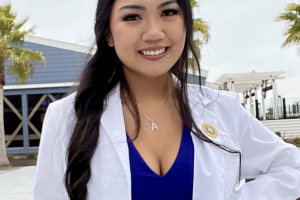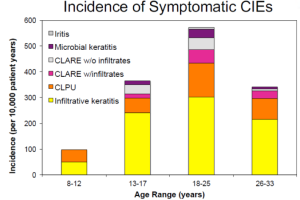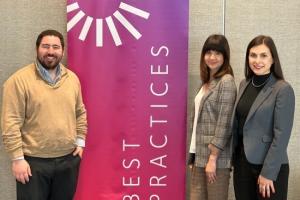by Ashley Han, OD3 @ Berkeley Optometry
What about Dr. Eileen Lo and the way she manages myopia and families do you think only comes with experience? How can you adapt that to the way you’ll take care of patients?

Dr. Lo is a pioneer in myopia control. Her years of experience is reflected in her troubleshooting abilities and flexibility in customizing treatments for each unique case. She has a loyal patient base who have been with her since they were in grade school and continue to see her even after graduating from myopia management. She also believes that building a relationship with the parents and the rest of the family is just as important. When I worked with her, I felt that she was deeply a part of the community that trusts and supports her.
I learned that becoming skilled at myopia management gives you opportunities to build strong, lasting relationships with your patients. It would be a privilege to see younger patients grow up and hear about their milestones. It is also a privilege to be accepted and loved by the community you serve. Like Dr. Lo, I want to show my patients that I care by thoughtfully inquiring and remembering details about them - where they go to school, their hobbies and interests, and their family members' well-being. They say it takes a community to raise a child, and it became clear that you can be a part of that community.
What about the patient population in Oakland Chinatown is unique? What role does the optometrist play in this community?
The patient population in Oakland Chinatown includes diverse socioeconomic backgrounds. For some families, the myopia control programs are a significant financial investment for the child’s future. It is the optometrist's job to understand the unique circumstances of each patient.
For example, the lack of insurance coverage for these treatments can be a hindrance for some families. The optometrist’s role is to empathize with the families concerns and make them feel included in the process via good communication and patient education.
Ultimately, parents are willing to pay out of pocket because they see great value in myopia control. In return, optometrists play a role in providing high quality care and reminding them of the value and impact of their decision.
Also, Oakland Chinatown has a large Asian population. Due to greater awareness and popularity of myopia management in certain Asian countries, I observed a number of patients who come in already familiar with the benefits of starting myopia control at an early age.
What are one or two memorable cases of children with myopia and their families that you can share with us?
I had the privilege of interviewing one of the parents who had all three of their children enrolled in myopia control. The mom had high myopia and was motivated to control the amount of myopia in her children. One of the children had high functioning autism and was successfully using Ortho-K lenses. I learned about their rocky start and the incredible patience and persistence it required from the doctor, parent, and child to go through the training process. Previously, the child would frequently break or lose his glasses. Now, the mom observes from afar, but she is very proud of the amount of independence her son has gained in cleaning and handling the lenses. She claims she can see more confidence in him since he started wearing the Ortho-K lenses; and he refuses to wear glasses now. He enjoys swimming and doesn’t have to worry about that anymore.
With your curiosity in myopia piqued from your interactions with Dr. Lo, Dr. Maria Liu, and Dr. Sarah Singh, what do you want to understand more in the fast changing field of myopia?
This program gave me an in-depth and well rounded understanding of the field of myopia. I was immersed in two very different modes of practice: a private practice vs. a clinical teaching institution at a university. Both gave me a wealth of knowledge and perspective about myopia management. However, in a field fueled by innovation and research, the doctor can never stop learning! I want to develop a more critical and discerning eye for all the new studies and technology that will be introduced in the near future. My mentors taught me that it is our responsibility to provide the most accurate, up-to-date information and evidence based treatment plan for our patients.
About Ashley Han:

I’m Ashley Han, an optometry student at Berkeley Optometry. I grew up in Southern California and graduated from UCLA in 2018 with an emphasis in public health. I then worked closely with eye doctors for two years before starting optometry school. In my free time, I enjoy exploring the Bay Area with my friends and experimenting ways to make delicious tea and coffee drinks at home.








